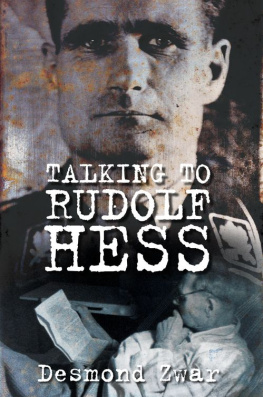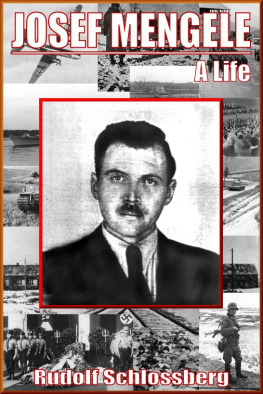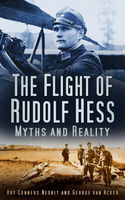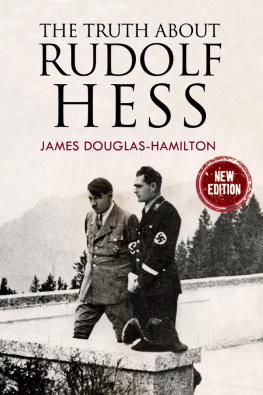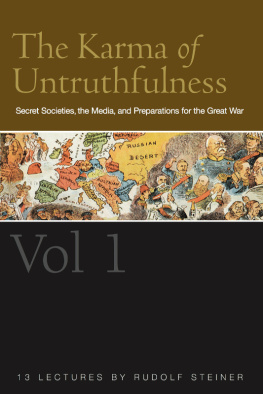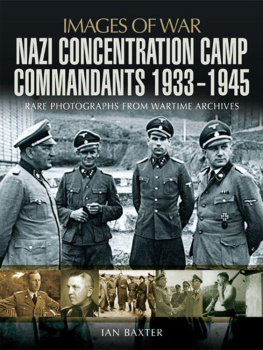Stephen McGinty - CAMP Z. The Secret Life of Rudolf Hess
Here you can read online Stephen McGinty - CAMP Z. The Secret Life of Rudolf Hess full text of the book (entire story) in english for free. Download pdf and epub, get meaning, cover and reviews about this ebook. year: 2011, publisher: Harper Collins, genre: Non-fiction. Description of the work, (preface) as well as reviews are available. Best literature library LitArk.com created for fans of good reading and offers a wide selection of genres:
Romance novel
Science fiction
Adventure
Detective
Science
History
Home and family
Prose
Art
Politics
Computer
Non-fiction
Religion
Business
Children
Humor
Choose a favorite category and find really read worthwhile books. Enjoy immersion in the world of imagination, feel the emotions of the characters or learn something new for yourself, make an fascinating discovery.
- Book:CAMP Z. The Secret Life of Rudolf Hess
- Author:
- Publisher:Harper Collins
- Genre:
- Year:2011
- Rating:3 / 5
- Favourites:Add to favourites
- Your mark:
- 60
- 1
- 2
- 3
- 4
- 5
CAMP Z. The Secret Life of Rudolf Hess: summary, description and annotation
We offer to read an annotation, description, summary or preface (depends on what the author of the book "CAMP Z. The Secret Life of Rudolf Hess" wrote himself). If you haven't found the necessary information about the book — write in the comments, we will try to find it.
CAMP Z. The Secret Life of Rudolf Hess — read online for free the complete book (whole text) full work
Below is the text of the book, divided by pages. System saving the place of the last page read, allows you to conveniently read the book "CAMP Z. The Secret Life of Rudolf Hess" online for free, without having to search again every time where you left off. Put a bookmark, and you can go to the page where you finished reading at any time.
Font size:
Interval:
Bookmark:

CAMP Z
THE SECRET LIFE OF RUDOLF HESS
STEPHEN McGINTY

For Margaret and Frank
To Lori, She was high society in a low Hollywood dive.
The psychiatrist suddenly found himself a participant in the inner history of world events.
Henry V. Dicks
The Hess episode was comedy from beginning to the end.
Sir Ivone Kirkpatrick
Arrival
At five oclock on the afternoon of 20 May 1941 a dark green army ambulance, marked with the distinctive Red Cross on a white circle, drove along the rural lanes of Surrey. Two hours earlier it had departed the portcullis gate of the Tower of London and headed south through a city which, ten days before, had sustained the heaviest night of bombing during the Blitz. On that same evening, as wave after wave of German bombers dropped their payload over the capital, four hundred miles north a lone Messerschmitt had flown across Scotland on a mission that would beguile a world at war.
Earlier in the day, a reconnaissance team had determined the swiftest route for the ambulances journey, and the roads on which it travelled were clear. But the windscreen still framed evidence of the destructive power of thousands of tonnes of high explosives as the vehicle passed houses reduced to rubble sculptures and streets rendered into flattened fields of brick.
At the wheel was a Scots Guardsman, accompanied on the passenger seat by a colleague while, leading the way in a nondescript car, was an escort of three members of the Coldstream Guards, their Tommy guns discreetly wrapped in rugs and each armed with a pistol.
In the back of the ambulance, rocking gently side to side, were two men in military uniform. While one wore the sand-coloured tunic of a doctor in the British Royal Army Medical Corps, his companion wore apparel of an entirely different hue, design and nationality. He was a distinctive figure in his polished black leather boots, puffed-out navy blue breeches, blue shirt, tightly knotted blue tie, and his fitted tunic jacket on the bright polished buttons of which were decoratively carried the distinctive eagle of the Luftwaffe.
Preparations for the ambulances arrival had begun a few days earlier. At 3.30 p.m. on Friday, 16 May 1941, Major Malcolm Scott received a telephone call at Donaldsons school camp in Edinburgh with curt instructions to hand over command to a new appointment who would be arriving the next day. He was then to report to Colonel Norman Coates at Hoban House in London at twelve noon on Sunday. After spending Saturday briefing his successor and nervously awaiting the auditors approval of the camp accounts, Major Scott caught the night train to London, which clanked out of Waverley Station at 10 p.m.
He was not alone in being shunted from one job to another. On that same Saturday, Colonel Swinton, the commanding officer of the training battalion of the Scots Guards, was enjoying the sunshine and the role of honoured spectator at the regimental sports day at their base in Pirbright. There, the Brigade Major arrived in great secrecy after luncheon and a conference was held in the middle of the croquet lawn. Swinton was to pick a team of men to secure the grounds of Mytchett Place against a covert enemy attack. Work was to begin immediately.
The following morning, in the office of Colonel Coates, Scott received a temporary promotion and his new orders. These were marked: Operation Order No: 1 Most Secret, and detailed as follows:
Major A.M. Scott:
These are your orders:
1. You will proceed to Camp Z at 12.00 hours on Sunday May 18th instant to take Command.
2. This camp is a special one and will be guarded by a contingent of Coldstream and Scots Guards from Pirbright.
3. You will be responsible for the custody of the prisoner at Z and for the security of the camp. You will be responsible also for the health and comfort of the prisoner. Food, books, writing materials, and recreation are to be provided for him. He is not to have newspapers nor wireless.
4. He is not to have any contacts with the outside world whatsoever.
5. He is not to have any visitors except those prescribed by the Foreign Office, who will present Military Permit A.F.A. 17 with the stamp of the D.D.P.W on the left, signed by Sir Alexander Cadogan, Permanent Under-Secretary at the Foreign Office and on the right, the Foreign Office stamp. No matter who the visitor may be he must not be allowed inside the perimeter of your camp unless he produces this authority.
6. The prisoner will not be allowed to send any letters whatsoever from your camp without first having been submitted to D.P.W.
7. All correspondence addressed to the prisoner, arriving at your Camp will be submitted in the first instance to D.P.W.
8. A small car is being attached to the camp for the purposes of contact.
9. You are accorded the local rank of Lieut. Colonel whilst employed as Commandant of Z Camp, but it will be clearly understood that when this special duty is completed you will revert to your personal rank.
10. Further orders will be issued to you in writing from time to time, and these orders will formulate your authority.
Signed: N. Coates. (D.D.P.W)
After Scott had read his new orders and noted that, according to the first, he was already late, he and Colonel Coates travelled by car to the camp.
The precise origins of Mytchett Place are unclear, but it is thought that it was built in 1779 on the site of an earlier farmhouse by a builder named John Hollest as a home for his mother-in-law, Mary Leigh Willis. The small dwelling was originally christened Mytchett House and held the name for sixteen years until the death of Mrs Willis in 1795, when the male ego exerted itself and it became known as the Hollest Place, after its creator who moved in with his wife.
Yet while John Hollest may have built the house, its later renovation and striking gardens were the work of different hands. Thomas Allason, whose principal job was as permanent surveyor to the Alliance Fire Office, was much influenced by the style of the ancient Greeks whose antiquities he had studied on a visit to the country in 1814. While his day job of advising on repairing fire damage brought him into frequent contact with the cream of society (families such as the Rothschilds, Montefiores and Ricardos), he established his private reputation with his work for the Earl of Shrewsbury. He designed various extensions to Alton Towers, but it was the layout of the gardens where his genius was most clearly exhibited. He also redecorated Blenheim Palace, in one of whose many commodious lavatories Winston Churchill was later born.
The Hollest family, like many, was unable to avoid the touch of tragedy. Mary Leigh Hollest died in 1820, followed nineteen years later by her husband, John in 1839. The estate and house were bequeathed to their eldest son, John Leigh Hollest who, four years later and for reasons unknown, changed his name by deed poll to John Leigh Williams.
As was the custom for younger sons who lacked the inheritance of land, George Hollest sought refuge and a comfortable living in the Church. Unfortunately, it was neither as safe nor reliable a sinecure as one might have expected. Instead, as the rector of Firmley, George became the victim of a notorious Victorian murder in 1850. He was shot in the stomach by a marble bullet on disturbing two burglars, after whom unaware of the extent of his injuries he then gave chase, A day and a half later, having endured great pain, he forgave his killers and died.
Font size:
Interval:
Bookmark:
Similar books «CAMP Z. The Secret Life of Rudolf Hess»
Look at similar books to CAMP Z. The Secret Life of Rudolf Hess. We have selected literature similar in name and meaning in the hope of providing readers with more options to find new, interesting, not yet read works.
Discussion, reviews of the book CAMP Z. The Secret Life of Rudolf Hess and just readers' own opinions. Leave your comments, write what you think about the work, its meaning or the main characters. Specify what exactly you liked and what you didn't like, and why you think so.




